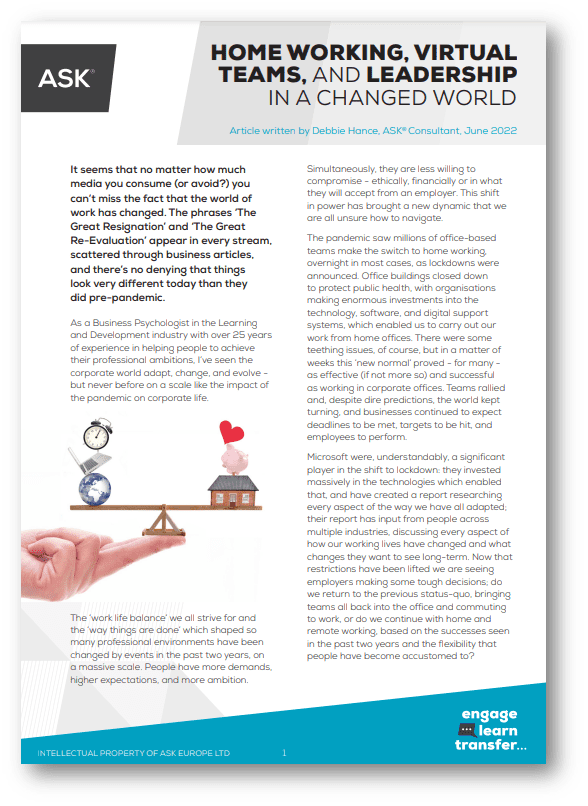Why Can't We Talk?
Is the art of communication dead?
Communication matters.
When you boil it down, all organisations are just networks; interlocking relationships – individual people in pursuit of (hopefully!) shared goals, aims or objectives.
No desk is an island, not matter how big or deep the metaphorical moat around them might sometimes feel, but when things go wrong or mistakes are made it is common to hear ‘miscommunication’ being singled out as the diagnosis.
But perhaps something else needs to be said here: that communication – or a lack of it – is more likely to be a symptom than a cause. What needs to be addressed is the underlying problem – or problems?
The following are just a few examples – we would be here all day if we tried to include them all!
Unclear Goals or Roles
If an employee is unclear about what is required or expected of them it is more a matter of luck than judgement that their work will meet the organisation’s (or their Manager’s) satisfaction.
If two people both think the other is responsible for something, chances are it will A) not be done, B) be done twice, but in different ways, or C) trigger disputes that could easily have been avoided.
An organisation – or manager – that can’t define responsibilities and set clear, unambiguous goals is unlikely to see them accomplished.
You can get what you want without asking for it, but that’s luck, not leadership.
Poorly defined Structures and Processes
If reporting lines are blurred, or teams have two (or more) ‘managers’ who aren’t able to co-ordinate or align their expectations, successful outcomes are unlikely.
Where a multi-disciplinary or cross-functional effort is required to achieve your objectives, you absolutely have to be sure that the hierarchy and lines of communication are clear. If you don’t, silo behaviours will encourage teams to work against or without each other, rather than together.
Your organisation needs every employee to have clarity – of purpose, of process and of progress.
Poor Leadership
Leadership is a responsibility, not a status.
It shouldn’t need explaining, but to lead is to set the direction: people’s willingness and ability to follow is largely dependent on knowing where they are being led.
If your organisation’s leaders are indecisive, if they fail to define a direction or provide clarity when it is sought, or they are unable (or worse, unwilling) to communicate their visions and strategies, employees will be left confused and floundering.
Their experience of poor communication and inadequate – or deliberately unhelpful – responses to requests for clarification are unlikely to inspire them to continue to communicate upwards.
Cultural Misunderstandings
In an increasingly globalised, multi-national and multi-cultural world, understanding across cultures is absolutely vital.
Attention to detail in one culture may be interpreted as micro-management in another. Even small incidents of personal manners can have an unexpected impact, if they differ from the local culture: an example from a UK citizen working in the Netherlands, taken from a Daily Telegraph article, shows how simple differences can cause big impacts:
“Being stopped by a Dutch airport official to be told that you look “so much better than your passport photo” becomes an amusingly phrased compliment. Numerous female friends have described going into work without make-up and immediately being told they look ill or tired. In the UK this would be a social faux pas, here in Amsterdam it is shrugged off as (you guessed it) Dutch directness.”
Are you fully engaged?
Demoralisation
When we are angry we might raise our voice. When we are demoralised, and no longer see any benefit to making our point, we are more likely to lower them – or even silence them.
There may be an element of ‘chicken and egg’ to disengagement and poor communication: this piece discusses the 12 questions in the GallupQ12 survey, an international standard in measuring employee engagement – and seven of them relate directly to communication issues:
- Do you know what is expected of you at work?
- In the last seven days, have you received recognition or praise for doing good work?
- Does your supervisor, or someone at work, seem to care about you as a person?
- Is there someone at work who encourages your development?
- At work, do your opinions seem to count?
- Does the mission/purpose of your company make you feel your job is important?
- In the last six months, has someone at work talked to you about your progress?
Inappropriate Leadership Style
Are your leaders dictating and issuing orders when it would be more effective for them to coach their teams? Telling, when it would be more inspiring or engaging to ask? Focusing their concern on tasks, at the expense of a concern for people?
Are they inviting dialogue and conversation, or are they broadcasting?
If the leadership communication style is ill-fitted to the situation, the outcome is unlikely to achieve the original objectives.
Inappropriate Behaviours
People don’t only stop communicating when they are demoralised. Sometimes silence descends because people are self-censoring irritated or inappropriate responses, or they are not communicating in the first place.
Attempting to gain power or hobble the performance of others by withholding information, indulging in gossip, rumour-mongering, belittling others – or, less malignantly but equally damagingly, criticising the person rather than the work – are all behaviours that we might wish to believe don’t happen, but they do.
In each case, communication is either their direct or indirect victim
If your organisation is being impacted by communication issues it is not only your discussions about under-performance that fall under the euphemistic heading of ‘Difficult Conversations’.
But if communication is an area you think you’d benefit from help in, just ASK…
Not only can we help with those difficult conversations, as specialists in behavioural change, we can also work with you on the broader management and leadership issues that underpin them.
To find out more, email us at hello@askeurope.com or call us on 01234 757575, to schedule a no-obligation chat with one of our specialist consultants.




